By Mahlon Meyer
(This story is made possible with the support of AARP)
Among the sea of heads and shoulders filling the T&T Supermarket as it opened in Bellevue, Washington on Thursday, a woman in a red jacket with gold leaves stood out.
Cindy Lee, 73, the founder of the mammoth chain of Asian-specialty supermarkets that have dominated the lives of so many Canadians, was making her way through the crowds like a swimmer coming ashore.
The occasion was the opening of the first-ever U.S. branch of her chain, now led by her daughter, Tina.
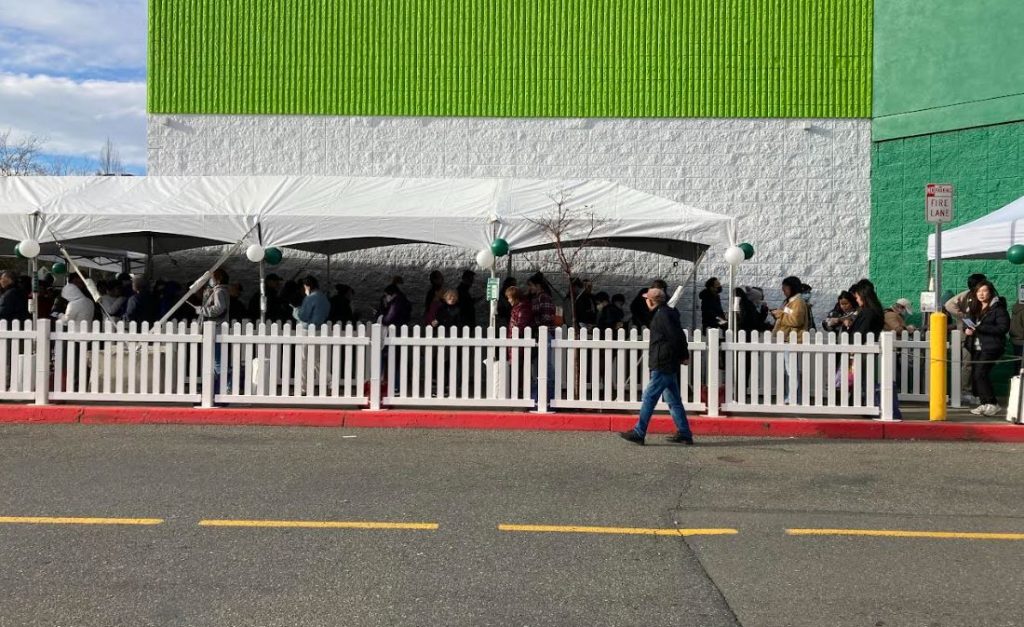
As she exulted in the success of the opening—crowds had snaked around the building starting at the early morning—she seemed to still carry the burden and stress of just starting out.
T&T Supermarket is Canada’s largest Asian grocery chain with over 35 locations in that country. In 2009, T&T was acquired by Loblaw Companies Limited, Canada’s largest retailer.
Cindy Lee remained CEO and the Lee family a significant shareholder. As of last year, T&T continued to outperform Loblaw’s other properties, according to Global News.
With the opening of their newest store, T&T offers a total of over 1.6 million square feet of retail space. Together with Loblaw, T&T is the largest importer of Chinese food to Canada. As a result, current CEO Tina Lee was invited with Canadian Prime Minister Justin Trudeau to Beijing in 2017 for Canada-China trade talks. So far, plans for expansion in the U.S. center on three stores, with Bellevue being the first.
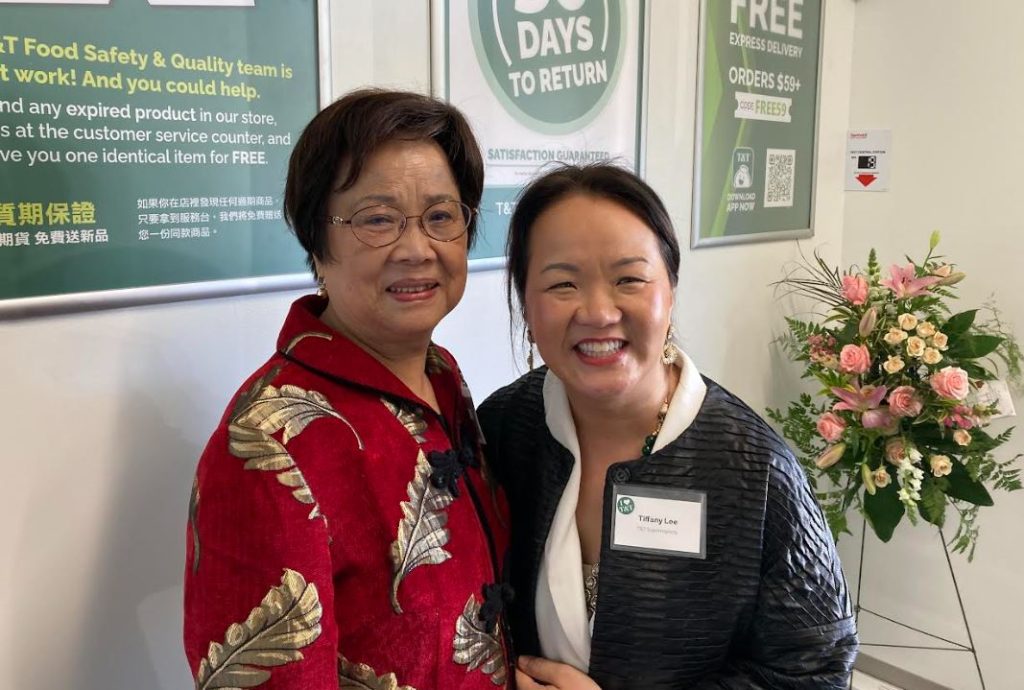
As the crowds seethed inside—a rough estimate put them at over a thousand people—Cathy Lee recalled her beginnings in an interview.
Depressed and discouraged as an immigrant from Taiwan, she was further incapacitated by a hearing difficulty.
Her brother, to cheer her up, took her to a dance hall.
“I remember watching this one woman dance, and she was so lovely in the way she moved, I thought, what wouldn’t I give to be like her,” she said.
But upon moving closer, she saw that the woman’s face was half paralyzed. Yet she still was dancing joyously.
“I realized then it’s all about your attitude,” she said.
So when she went to the government Human Resources division to look for a job, she wouldn’t take no for an answer.
She took an accounting test, and the examiner said her score was “not bad.”
But she had no experience working in Canada, he said. So she couldn’t be hired.
“How am I going to get experience without having any?” she thought.
She walked dejectedly to the door. Then an inspiration struck. She turned around and said: “I’ll work for free.”
The officer was so impressed, he found her a job at an accounting firm.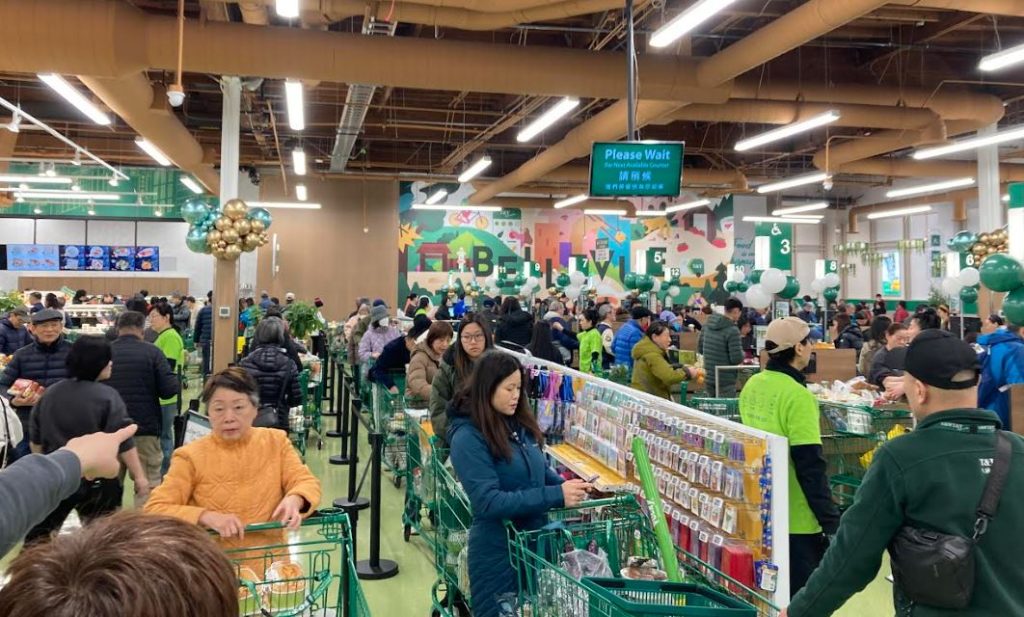
As she surveys the scene behind her—long lines at the checkouts, shopping carts piled high with specialty foods, frantic customers trying to get the best deals and their favorite delicacies, rushing around the crowded store—Lee pulls herself up and squares her shoulders and says, “That’s what it’s been all along. Having a good attitude.”
The opening of the mammoth store in Bellevue was one of many milestones for her and her family. In 1993, she opened her first T&T stores in Burnaby and Richmond, British Columbia, soon followed by dozens of other locations. As she spread her empire, the stores became magnets for Asians living in both Canada and the United States yearning for real Asian food and products. For decades, Asian Americans living in the Seattle area have driven up across the Canadian border to frequent the T and T Markets across the border.
“Finally, I don’t have to drive three hours anymore,” said one Chinese fan on social media.
The opening of their first U.S. branch was fraught with an untold number of disasters. COVID delayed it, as did delay in getting a transformer and other electrical parts. Tina Lee, speaking to reporters at a pre-store opening event on Wednesday, said the minutiae of American tax laws and other regulations required a comprehensive overhaul of their approaches.
She vowed the company will enforce stringent safety requirements for many of its goods imported from overseas, such as sending products to independent laboratories for testing for 300 different heavy metals.
“We’re not afraid of product recalls if they are necessary. Safety is our number one concern,” she said.
So far, it seemed like their bet had paid off. The day before the grand opening, Tina Lee was still crossing her fingers, literally, and telling reporters she hoped people would show up. Plans to open two more stores in the U.S.—one in Lynnwood, Washington, and the other in San Jose, CA—to some extent depended on the success of this one. Boy, was she wrong to worry. As of noon, even hours after their official opening, the outside of the store, painted a bright cheery green, was still throbbing with double packed lines of customers.
Many were curious. They wanted to just see. Others were ready to be offended if their beloved brands, that they had grown used to in the Canadian stories, were even slightly different in the U.S. store.
A middle-aged woman from Guangzhou, surnamed Cheng, with red dyed hair, said that if the flavor of her favorite cake was off even by a tiny bit, she “would be able to tell.”
She had driven all the way from Kent, a 45-minute drive, to sample that cake and see if it were the same.
Others were driven by the value and the familiarity of the food. A 22-year-old restaurant worker from Shandong named Chen Zhao, who had long flowing hair, was in line at 9:00 am and waited for two hours. His shopping cart was filled to overflowing with boxes of Peking Duck, Japanese ice cream, and too many other items to enumerate.
He said he would know if it was good after he had taken it home and eaten it.
At this point, after his long wait, and the crowds in the store, he “just wanted to go home.”
One reason for the success of the supermarkets—and apparently their U.S. splash—is how closely the mission of the owners matches the motivations of the shoppers.
T & T Supermarkets aim “to help Asian families connect with their past in their lives outside of Asia through time and between generations,” said Tina Lee.
Items you would never find outside of Asia line the shelves, from lava mochi puffs to Taiwan fruit beer, to a Sulwhasoo Ginseng Renewing set.
Kids are part of everything and encouraged to take part in the shopping. Tina Lee said, as a kid, she had a tiny toy shopping cart she received as a present and she would bring it to the T&T Supermarket in Richmond. Now, the T&T Supermarket in Bellevue, as elsewhere, has loads of tiny shopping carts for kids with the sign “customer in training” hoisted above each one.
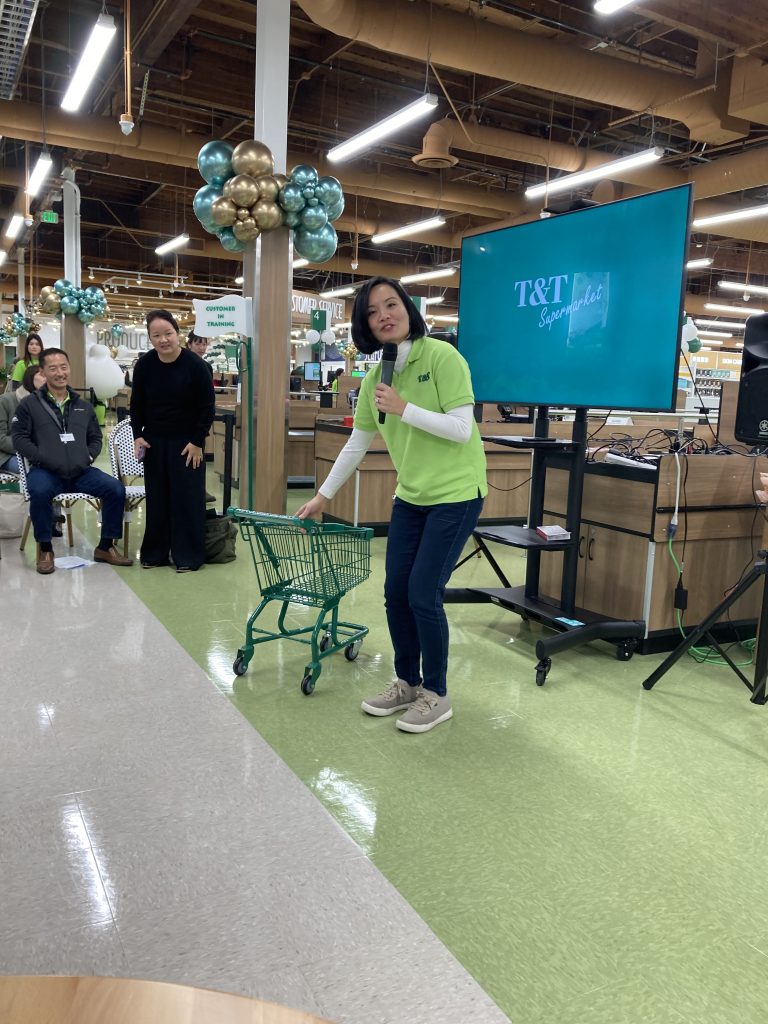
Tina Lee also lowered shelves, for instance for fruit, so kids can take part in selecting apples with their parents. Not to be outdone in food safety, the bathrooms also contain sinks (at least one) that are lower to the ground so kids can wash their hands—without their parents having to pick them up.
Buying in volume and sourcing many of the steps of food preparation to in-house is how Tina Lee and her team keep prices relatively low, she said.
Holding up her hand, covering the price on a display board, she asked an assembly of 50 reporters and influencers to guess how much a bunch of green onions were.
“You pay 99 cents for a bunch here, don’t you?” she said.
Then, playfully pulling her hand away, she showed that the price at T&T was $1 for four bunches.
There were gasps.
Later, on a tour, she showed off a team of butchers behind glass that she said did all their cutting in-store.
“Asian cuts of meat are also different than typically American cuts,” she said.
Upon the far wall of the store is a long line of dim sum—hum bao, various tarts, and more.
“I consider these pork-filled buns to be the answer to McDonald’s,” said Tina Lee. “As a mom with three kids, I can just grab a couple and eat them on the run.”
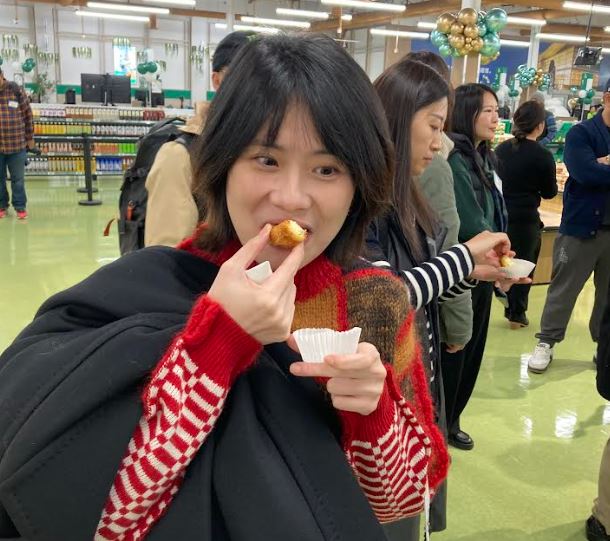
Would they prove a disaster for Seattle’s Chinatown, though? If one could find one-stop shopping here, as well as Peking duck with all the trimmings, turkey stuffed with sticky rice, all the groceries you need for a week or month, including bamboo eco-friendly toilet paper, and then simply pop over to the side of the store to fill up on dim sum, wouldn’t that put Chinatown out of business?
Not so, said many customers waiting in line.
They would still make the trip to “famous” dim sum spots in Chinatown.
T&T “won’t steal business from Chinatown,” said Monica Chen, 27, who graduated from Western Washington University with a degree in marketing and is currently looking for work. She was with her mother and grandmother, both from Guangzhou. They would all continue to go to Jade Garden, a popular eatery, for example.
For Tina Lee, T & T is “the next step” from Chinatown.
“I grew up in a loft on Main Street in Vancouver’s Chinatown,” she said, her parents going from door to door there for their merchandising business and learning to speak Cantonese.
For many, the grand opening seemed something of a homecoming. Wendy Yang, a social media influencer with 5,000 followers on Redbook, said she had gone to the T&T Supermarket in Toronto when she was a student. She was filming while her aunt took care of her baby in a stroller nearby.
The contrast between the day before, when reporters saw the huge 76,000 square foot space, gleaming and open, with the following day cannot be overstated.
The huge hangar-size store was so packed with people that it was literally like wading through mud or tall grass to try to move forward. One had to constantly turn one’s body sideways to squeeze through jams of people with shopping carts. Traffic was directed by workers waving giant blow-up fake sausages. And the frenzy of drums from the front door trickled through every space.
“I haven’t seen this many people so closely packed together since I was in Shanghai or Beijing,” I said to Tiffany Lee, the other daughter of the founder.
“Yes, and it’s orderly, like there,” she said.
This, then, was a victory of the sort her mother had chalked up to having a good attitude.
Except in this case, everyone in the store seemed to have one.
AsAmNews is published by the non-profit, Asian American Media Inc.
We are supported through donations and such charitable organizations as the Robert Wood Johnson Foundation. Donations to Asian American Media Inc and AsAmNews are tax-deductible. It’s never too late to give.
Please also follow us on Instagram, TikTok, Facebook, YouTube and X.

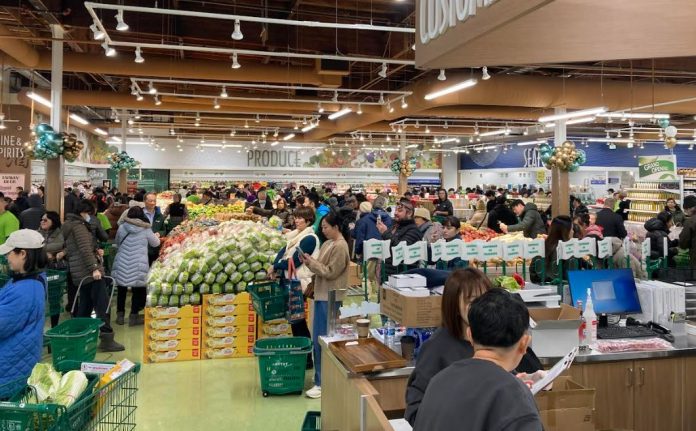
Thank you for sharing! These stories are so important and inspiring.